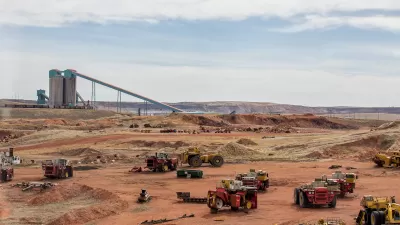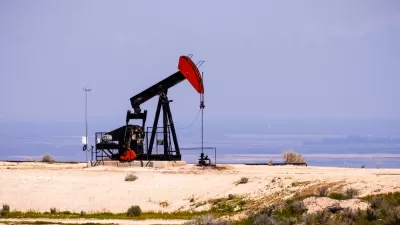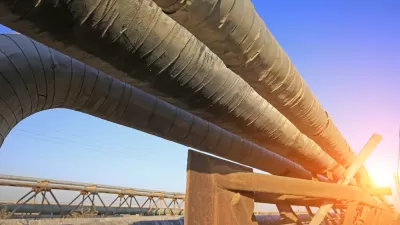Once again, the president's efforts to undo his predecessor's environmental legacy were thwarted by a court ruling. In this case, the Interior Department's failure to conduct an environmental review of a Trump executive order ran afoul of NEPA.

"A federal judge late Friday delivered a significant setback to the Trump administration’s policy of promoting coal, ruling that the Interior Department acted illegally when it sought to lift an Obama-era moratorium [also posted here] on coal mining on public lands," writes Coral Davenport, who covers energy and environmental policy for The New York Times.
As part of President Trump's executive order on March 28, 2017, to roll back former President Obama's clean power plan rule and promote the extraction of fossil fuels, particularly coal, then-Secretary of the Interior Ryan Zinke was directed to lift the moratorium.
"Earthjustice filed the legal challenge mere hours after Zinke issued the order," writes Rebecca Bowe for the San Francisco-based non-profit public interest organization dedicated to litigating environmental issues.
The Northern Cheyenne Tribe, ecoCheyenne and the Montana Environmental Information Center, along with other national and regional conservation groups, including the Sierra Club, signed on to the lawsuit [pdf]. [See Bowe's March 29, 2017 article.]
Department of Interior officials, called "Federal Defendants" in the April 19, 34-page ruling [pdf] by Judge Morris, chose not to conduct an environmental review in lifting the moratorium, claiming that the move was a mere "policy shift." The court disagreed. From page 27:
The Court has concluded that the Zinke Order constituted a major federal action. ... The initiation of the NEPA [National Environmental Policy Act] process proves to be a “discrete agency action that it is required to take.” ... Federal Defendants’ decision not to initiate the NEPA process proves arbitrary and capricious.
While the ruling temporarily halts the sale of new coal leases on federal land, it doe not reinstate the actual moratorium which was issued by then-Secretary of the Interior Sally Jewell in her order to conduct a review of the financial and social costs associated with coal mining on federal lands as noted in her January 2016 press release.
While Morris wrote that "Federal Defendants must comply with the requirements of NEPA," he also wrote, "the Court cannot compel Federal Defendants at this time to prepare a PEIS [programmatic environmental impact statement], or supplemental PEIS, as Plaintiffs request."
"The decision means that 'the Interior Department has to go back to the drawing board if they want to continue to sell coal mining leases on public lands — they have to do a better job of legally and scientifically justifying this,' said Jenny Harbine, an attorney for Earthjustice, who took part in the oral arguments against the Trump administration," writes Davenport.
The judge also told the plaintiffs and defendants that in the coming months he will put forth a second legal decision on whether the Obama-era mining ban should be reinstated.
The ruling comes from the same judge and district court that halted construction of the Keystone XL pipeline last November in a ruling that bore a resemblance to Friday's ruling as both are based on following requirements specified in the National Environmental Policy Act. "The Department [of State] ... simply discarded prior factual findings related to climate change to support its course reversal," wrote Morris in the 54-page ruling [pdf].
Additional news articles on last Friday's court ruling:
- Judge: Resumption of US coal sales by Trump needs review, by Matthew Brown, AP via Washington Post.
- Judge Hands Trump Another Setback, This Time on Coal Leases on Federal Land, by David Boddiger, Splinter News
Related in Planetizen:
-
Federal Judge in Montana Halts Construction of Keystone XL Pipeline, November 15, 2018
-
Interior Department Halts New Coal Leases on Federal Lands, January 18, 2016
FULL STORY: Judge Delivers Major Setback to Trump Policy to Increase Coal Mining on Federal Land

Maui's Vacation Rental Debate Turns Ugly
Verbal attacks, misinformation campaigns and fistfights plague a high-stakes debate to convert thousands of vacation rentals into long-term housing.

Planetizen Federal Action Tracker
A weekly monitor of how Trump’s orders and actions are impacting planners and planning in America.

In Urban Planning, AI Prompting Could be the New Design Thinking
Creativity has long been key to great urban design. What if we see AI as our new creative partner?

King County Supportive Housing Program Offers Hope for Unhoused Residents
The county is taking a ‘Housing First’ approach that prioritizes getting people into housing, then offering wraparound supportive services.

Researchers Use AI to Get Clearer Picture of US Housing
Analysts are using artificial intelligence to supercharge their research by allowing them to comb through data faster. Though these AI tools can be error prone, they save time and housing researchers are optimistic about the future.

Making Shared Micromobility More Inclusive
Cities and shared mobility system operators can do more to include people with disabilities in planning and operations, per a new report.
Urban Design for Planners 1: Software Tools
This six-course series explores essential urban design concepts using open source software and equips planners with the tools they need to participate fully in the urban design process.
Planning for Universal Design
Learn the tools for implementing Universal Design in planning regulations.
planning NEXT
Appalachian Highlands Housing Partners
Mpact (founded as Rail~Volution)
City of Camden Redevelopment Agency
City of Astoria
City of Portland
City of Laramie





























